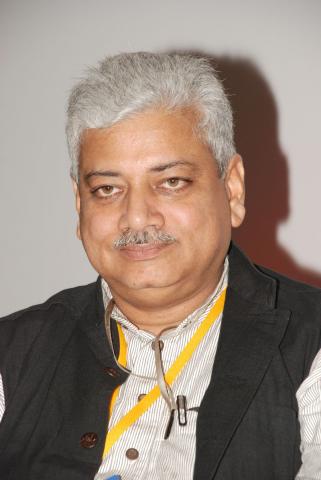The play Taoos Chaman Ki Myna, was recently staged at AD Rangamandira in Bangalore and it was the culmination of an alchemy between Naiyer Masud, Gillo,Theatre Repertory and Atul Tiwari. The genesis of the play is interesting. For starters, Masud, a Persian and Urdu scholar is along with Manto and Qurratulain Hyder, part of a holy trinity of writers who truly transcend the sub-continent with their universality. This winner of Saraswati Samman, has been gushed over by international critics but perhaps it is simplicity that defines his work. This simplicity drew Shaili Sathyu, the artistic director of the Gillo Theatre Repertory, the daughter of MS Sathyu and Shama Zaidi to Masud’s story, Taoos Chaman Ki Myna (The Myna from the Peacock Garden). The story was then adapted by theatre director, writer and actor Atul Tiwari.
**
Tiwari who has written scripts of films like Mission Kashmir,Vishwaroopam and its sequel was raised in Lucknow and is a great admirer of Masud. He brought to life in a two hour play, the Lucknow of the 1850s, the delicate dynamics of a father’s relationship with a daughter and the aftershocks that follow the theft of a myna.
**
The play being produced by Gillo Theatre Repertory, is a whiff of nostalgia from another time and Atul says, “This adaptation is my tribute to Naiyer Masud who was ailing when I presented my version of his story to him and he was happy with the changes I had made.For me ‘Ganga Jamuni tehzeeb‘ (the confluence of Hindu and Islamic cultures) is not just a phrase. I was raised in a Shia Muslim household. I called those who raised me, Ammi and Abba..I have grown up in Lucknow as a witness to a certain grace and gravitas that is not just fictional.”
**
He adds, “My primary intention while adapting the story was to stay as faithful as possible to the language, to the man (Masud) and his literature.The story is timeless and touches hearts across generations just like Premchand’s short story Eidgaah, did. I did not simplify the Urdu words because the audience can understand them if they apply themselves a bit. For instance, I could have called the play, ‘mayur or mor (peacock) chaman ki maina‘ but I did not change the word, ‘taoos,’ because we all have heard the word, ‘takht-e-taoos‘ (the peacock throne) and my job is to just jog your memory to bring you to the same page, to make Urdu accessible to you.”
**
Does the dilution and fragmentation of language bother him? He says, “Change is the only constant in the world and I won’t say..language has been dumbed down..fragmented perhaps because of the usage of sms abbreviations. When Ghalib started using Persian words in poetry…poet Nazir Akbarabadi was being dismissed for using street Urdu in his nazms. This too was change..even though ‘non-fragmented.’ Today, we are not making anything more beautiful though we are all hurrying towards change.”
**
Does he rue the absence of men like Masud from our collective consciousness? He answers, “Change is inevitable but we owe respect to what has gone before us because we are standing on the shoulders of giants..of times gone by. This play showcases my reverence, respect and love for Lucknow. The culture it represents is summed up in just one line from the play when a thief who has stolen the myna from a garden for his daughter is told, `chori uss ghar se ki jaati hai..jahan maangne se kuch na mile..(you steal from a home where you won’t get what you need..even though you ask).’ The thief is told, ‘you should have just asked for the myna in my garden for the myna in yours.”’
**
Atul Tiwari hopes that after watching the play, some young minds at least will accord Naiyer Masud a place in their memories.

with
The New Indian Express Reema Moudgil works for The New Indian Express, Bangalore, is the author of Perfect Eight, the editor of Chicken Soup for the Soul-Indian Women, an artist, a former RJ and a mother. She dreams of a cottage of her own that opens to a garden and where she can write more books, paint, listen to music and just be.
 with The New Indian Express Reema Moudgil works for The New Indian Express, Bangalore, is the author of Perfect Eight, the editor of Chicken Soup for the Soul-Indian Women, an artist, a former RJ and a mother. She dreams of a cottage of her own that opens to a garden and where she can write more books, paint, listen to music and just be.
with The New Indian Express Reema Moudgil works for The New Indian Express, Bangalore, is the author of Perfect Eight, the editor of Chicken Soup for the Soul-Indian Women, an artist, a former RJ and a mother. She dreams of a cottage of her own that opens to a garden and where she can write more books, paint, listen to music and just be.





